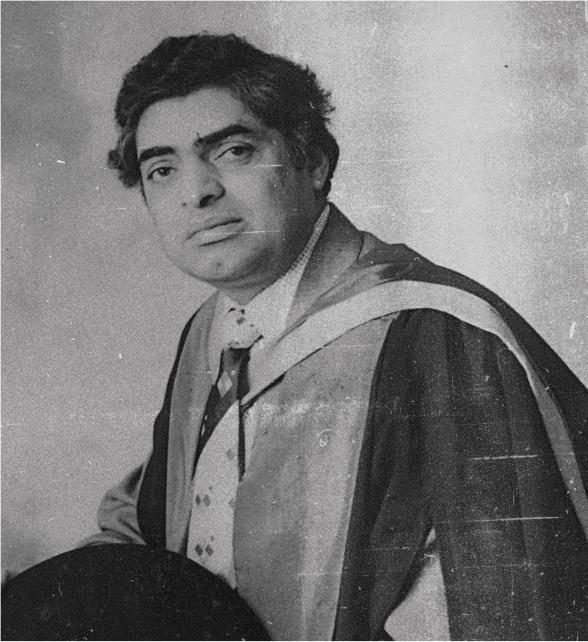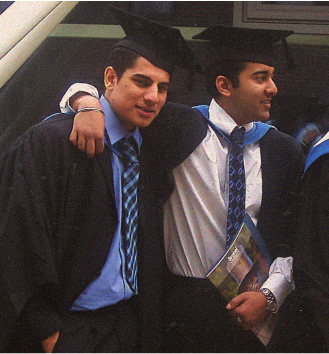How did Virtual Employee start?
This might sound a bit unusual, but in many ways, I believe Virtual Employee started before I was even born, essentially beginning with my grandfather.
My grandfather was born in Punjab, India, and at the age of eleven, he faced the sudden passing of his father. During those times, this tragedy automatically placed the mantle of head of the household on the eldest son, who was my grandfather.
Imagine being eleven years old and suddenly responsible for a younger brother, a younger sister, and a mother. He had to shoulder these enormous responsibilities as a child himself, and life in India then was extremely challenging. On top of that my grandfather lived in a village—ancestrally we are farmers. Although my great-grandfather was the headmaster of the local village school—his passing meant my grandfather could no longer afford to continue his education as he was expected to manage the farmland to support his family.
Despite these challenges, my grandfather not only took care of his land and family but also pursued his education by consistently winning scholarships, even despite my great-grandmother’s disapproval. He eventually became a professor and helped his brother become a doctor and his sister a teacher. His journey led him to migrate first to the UK and then to the USA, where he taught electrical and robotic engineering at Purdue University.
Growing up, my grandfather’s story was a source of immense inspiration for me.
It kind of sowed these seeds that there is nothing you cannot do or overcome. There was also this unspoken sentiment that I won’t ever be able to surpass the achievements of my grandfather—with the kind of obstacles he faced and the opportunities I had—nothing I was ever going to do was going to compare to his journey.



Maybe on some level that made me think very ambitiously from a very young age—because in our family that was the only way you were going to do something impressive. I don’t know if it was innate, environmental or a combination of the two—as an entrepreneur, I now study a lot of marketing and psychology and so I know full well the power of storytelling, legacy and expectations so I certainly think it could have been a big factor.
In short, from a young age—I was thinking very ambitiously and in addition to that believed that big things could be achieved because I saw a perfect example of that in my grandfather.
Maybe that was also to some extent true for my dad—who has equally also always been very ambitious. So, I think the seeds for what later would eventually go on to become Virtual Employee were actually sown many decades before.
At school, however, I was among the few students who had no clear career path in mind. No profession truly appealed to me.
Looking back, I attribute my disinterest partly to the education system. The teachers aren’t to blame—it’s the system—one that in my opinion, tends to stifle imagination, favoring rote memorization over actually thinking creatively. When I was at school there was very little emphasis on critical thinking or out-of-the-box thinking.
It's only in the last few years that I've really begun to appreciate what science truly represents: a field that ignites the imagination, encourages asking big questions, and invites thoughts about undiscovered possibilities.
It's funny because now I love studying and reading—that too a wide range of topics from coding, psychology and communication to statistics, science, and history. I think it’s because I now can draw the connection—between learning and its practical application. I’d love to to go back to university in the near future.
My experience in school however, shared I think by many, was starkly different from this ideal. Physics lacked any integration with engineering, while my chief memory of chemistry is repetitive titrations, devoid of any real-life application. In our ICT (Information Computer Systems) classes, we didn't learn any coding; instead, we were bogged down with basic assignments in Microsoft PowerPoint and Excel.
Presently, as I listen to 'ENIAC: The Triumphs and Tragedies of the World's First Computer' on Audible, I find myself deeply intrigued by the genesis for a 'thinking machine' and the process of its creation. This fascination starkly contrasts with my school experiences, making me wonder and frustrated at why we weren't engaged with thought-provoking questions like "how do you make electricity 'think'" in our computer science lessons. Such inquiries could have brought the subject to life and stimulated our young minds. It almost seems as if the curriculum was designed to suppress creativity and render fascinating subjects tedious and dull.
In short, reflecting on my school years, I remember feeling quite lost regarding my future. Eventually, I chose to study Law at university, not out of a clear passion for the subject, but because it seemed like a practical choice.
Looking back that turned out to be a pretty terrible decision—I don’t think I really acquired many skills that have helped me as an entrepreneur. That was an early and important lesson on why it’s important to learn to think for yourself rather than do what your peer group is impressed with.
Anyway, as I got closer to graduating—there was this massive void in front of me. I had a place to do a master’s in law—specifically Jurisprudence, (essentially the philosophy of law) at University College London. It was the one area of law that did interest me—where you could really think, and it bought me time to figure out what I wanted to do. But it was only a year program, and I still had no intention of applying for any legal training contracts and becoming a lawyer for that matter.
Professionally, my dad was a software engineer, but he also ventured into entrepreneurship, experiencing varying degrees of success. For instance, he pioneered the first online real estate business in the UK around 1998/1999, offering services at a radically disruptive 1% commission. Remarkably, the business turned a profit in its second year. Looking back, had he continued with that venture, he likely would have achieved great success as well-known brands like Purple Bricks have now gone on to do. However, it wasn't meant to be. This experience served as another lesson for me: success in business requires focus and playing the long game and not getting distracted by other opportunities.
Another lesson he always preached was the importance of unity and ‘a team’ for success in entrepreneurship—as he later told me, he was privately hoping for us to start something together when I graduated.
I’d have to say he is right—two people aren’t twice as good as one person—they are four or five times as good. Unity really is a golden rule for success, whether it is sports, business, politics, and communities at large, its more often than not silently underpinning everything in the background.
So, when I graduated my dad came to me with a couple of business ideas and over the summer, I was agonisingly debating what to do.
As I thought it over during the summer, I concluded that I was doing a master’s for other people —because I wanted their adulation and respect. Sometimes it takes courage to do what’s right for you.
When my dad first shared the concept of Virtual Employee with me, it immediately resonated, and I felt motivated. Traditional project outsourcing, though appealing on paper, was fraught with practical challenges and often costly. Not to mention what about those businesses that didn’t want to give up the reigns and retain direct oversight of their work. Conversely, freelancing suffered from issues of unprofessionalism and a lack of accountability, most importantly businesses were not getting teams dedicated to them.
There was a clear gap in the market and VE represented an ideal middle ground, offering the cost benefits of offshoring while allowing clients to retain control. Our aim was to empower SMEs to set up their own small captive units overseas seamlessly, just like large multinational corporations. Instead of limiting businesses to our in-house talent pool, we would also go one step further and give clients the option to actively headhunt professionals based on their specific needs in any field. This approach was set to be the first truly bespoke and tailor-made outsourcing service geared towards small to medium sized businesses.
We pioneered the VE offshoring model and continue to be the sole providers of this service in its most comprehensive and authentic form. The credit for this innovative idea truly belongs to my dad, not me. This blend of legacy, ambition, passion, and redemption was the foundation upon which VE was started. The rest as they say is history.

Be a part of
our ongoing story.
This isn't just our story; it's an invitation. Whether you need help with your business or you're looking to join a forward-thinking team, there's a place for you here. Join us and grow with VE.

